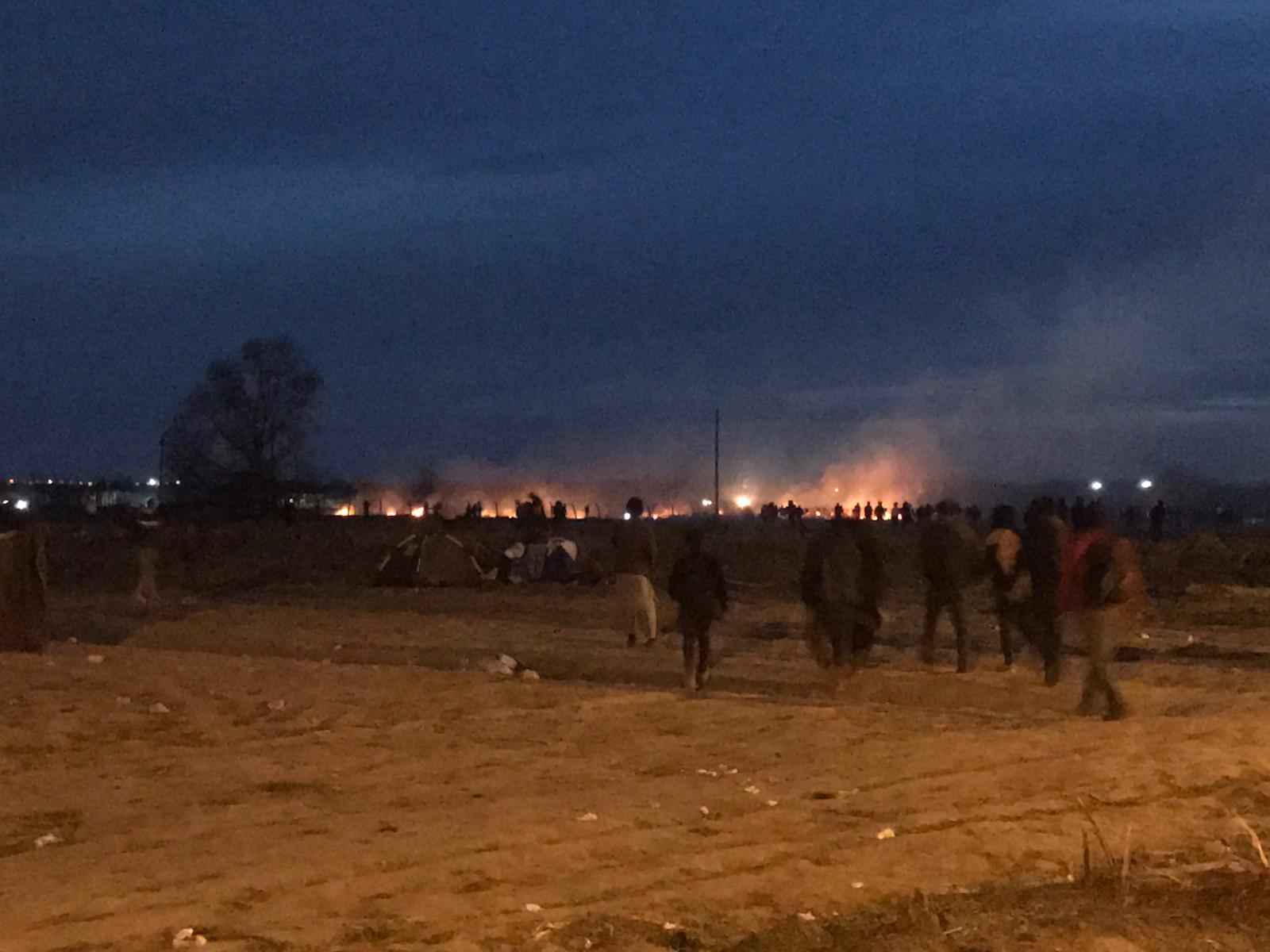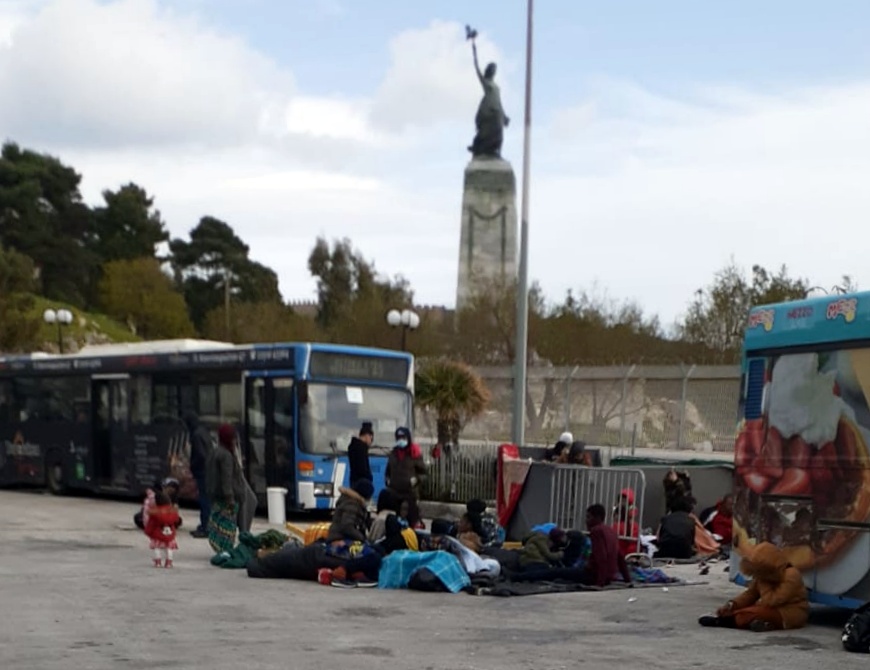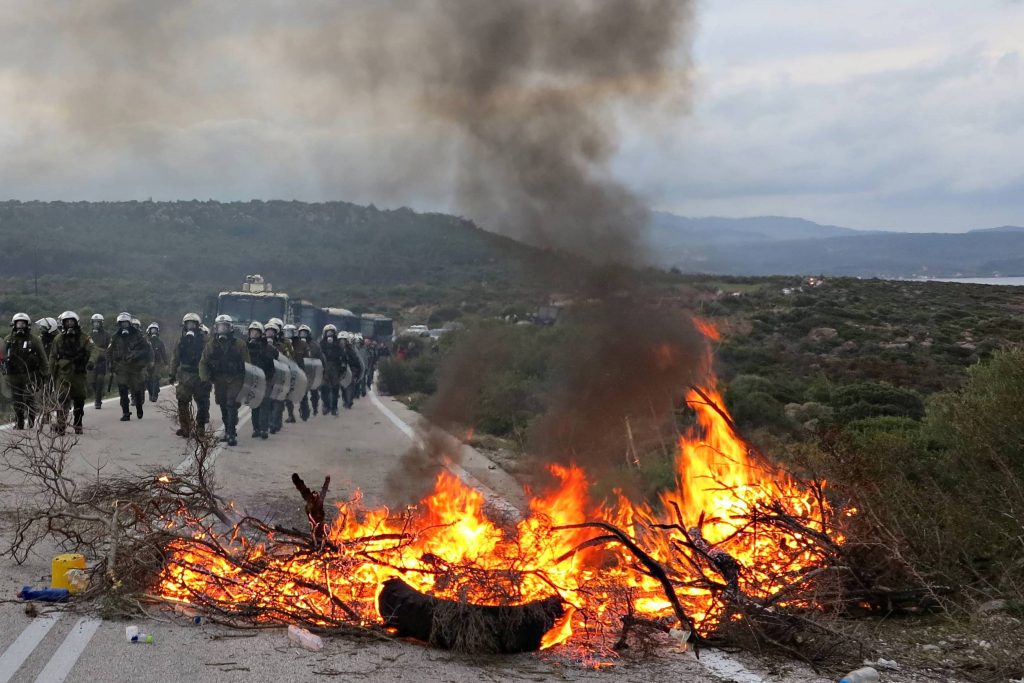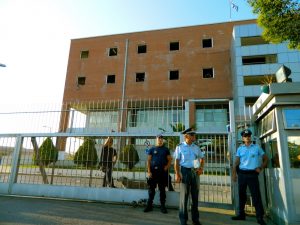
A characteristic testimony: “When we came here they forbade us to wear our headscarves and told us:” Out of here you can be Muslim, here NO! Here you are Christians… ”
Another testimony: “A police officer invaded into the shower room, while a prisoner was bathing, and made her pull the towel…” At the time, the health of several of them was very bad. Despite our own pressure for two women to be transferred to a hospital as emergency cases, nothing really changed. Τhese women are still very sick. Also, there are no doctors during weekends and during the night time, at Petrou Ralli. On Christmas day we were informed by relatives of prisoners for possible initiation of a few women on hunger strike. The day after our visit they started writing their experiences in the following denunciation letter, where they describe them with their own voices. Experiences that we can simply only imagine. Women from six different countries asked their will for their letter to be publicized. When you have lost everything you do not fear anything.
Their voices should be heard in the whole world. You can discuss it in your assemblies. The organizations and institutions that talk about human rights should stop fooling us and playing with the plight of migrants and refugees, who are led to extermination.
We stand by and admire these women for their bravery and solidarity they show to each other…
No person illegal, no person invisible
Our Rebel sisters are right for the abolition of detention centers and opening of Borders
for stopping illegal racist & misogynist behaviors
for smashing verbal, physical and mental torture
The passion for freedom is stronger than all kinds of prisons
In streets, in squares and prison cells, migrant women you are not alone
The House of Women, for the Empowerment & Emancipation
spiti.gynaikon@gmail.com
(translated in English from the original)
“Greece, Allodapon (Immigrant House) PRISON 20-12-2019
That so-called-immigration office is such a hideous and villainous place that makes anyone forget his/her humanity. Nothing is legal here. Lies, molestation, sexual abuse, diseases, neglection, squalidity, ill-treatment, beating, insult…You literally face with all of these.
Above all, how can they dare? If Europe doesn’t know, how come they dare? Maybe it is a conspiracy! Here we are locked into wards 3-4 times a day which are filthy and full of lice. Only after hitting the iron fences over and over, a policewoman asks «what», by shouting and insulting. They treat us as if we are animals. (not even animals should be treated like this). They took our mobile phones on the first day and didn’t give it back to prevent us to take pictures or videos. Even the lawyers can’t come inside. When the volunteers of organization companies come we are locked. Volunteers are told a lot of lies. For example, they are told we stay here 2 weeks maximum. Most of us are here for 1,5 months. There are people here who stay for 4 months without being told anything.
We are being taken to airing twice a day like herds. When the time is off, they shout ‘Inside’, and lock us inside the wards. When people need to go to the toilets, they have to shout, punch, kick the doors. Sometimes, only sometimes, a policewoman comes after 15-20 minutes. Other times no one comes. Even if one of us dies at those times, no one cares.
Ceylan Pinar Kanli, Turkish. Everybody is sick. Everybody has wounds because of the filth. Some of us even have cysts. For example, I have cysts all over my body. After 5 days, they took me to the doctor inside the immigration house. He said “you should go to the hospital immediately. You need a blood analysis. It is urgent.” Despite that, they make me wait. It has been 5 days.
We do the cleaning ourselves. We have neither shampoo nor soap. Nothing… The ones who have visitors are lucky, what about the others? They ask the ones with visitors to buy things for their needs if they have money. Our friends without money, they either ask to share or they smell.
There is no word to describe the toilets. No detergents, no soaps, nothing! The toilets changed their color because of the dirt and filth. The ones with wet handkerchiefs wrap their noses and face to be able to enter the toilets. The ones without handkerchiefs mostly vomit.
And the policemen! Under the pretext of distributing food, they touch and harass women. This is a horrible place.
The ward on the right belongs to men. The inhuman beating by the police (the victim was a man called MECIT) shouldn’t be ignored. 4 cops kicked him to death barbarously. I can’t forget his ashamed looks because he was beaten in front of all of us.
The food they give both cold and smells! Tomatoes and oranges are rotten. Even to drink water we have a timetable. Water drinking time… We have to drink that disgusting, smelling water. When I said ‘I can’t drink this water. May I buy from outside?’ the policemen laughed a lot and said ‘You have to’. There are a lot of things to say about that place… The sentences on the walls, relentless tears, and continuous supplications.
All are here in that hell.
Alla from Syria, whose headscarf is pulled from her head
Aisha from Somalia, who can’t walk because of the cysts, who is taken to hospital in the middle of the night and when the inflammation gets a bit better, taken back in prison.
And us, who are insulted every day, 1 Iranian, 3 Albanian girls who were abused.
That place is not an immigration office, it is a torture house. I believe I will be able to go out but it’s not only me. After me, there are lots of women who haven’t got any money, a lawyer. They have no one. There are children hereunder 18 and it is not legal.
Please help us. The women who were on indefinite hunger strike ate for the first time after 3 days. No one cares.
Esraa Kreash (Syria), age 22. Esraa is on medication for her psychological condition under the supervision of a doctor twice a day. However, the police gave her only once at night. For a day, they didn’t give her any. Then, Esra didn’t take the pills at night and the next day she took two of the pills. Because she took two pills in a day (she took one in a day for 20 days before), she slept. When she woke up, she went out airing. The police said that the time was off. She had to go inside, but she knew neither English nor Greek. So she didn’t understand.
After that, the police pulled her arms hard and pushed her. Esra attacked the police’s hair. 4 police came from inside. 2 policemen handcuffed her, 2 policewomen hit her arms. And in front of all of us, they dragged her on the floor and locked her in a cell. They left her handcuffed in the cell without food until night. She cried a lot, knocked the door continuously but they didn’t open it until the night shift. She only knows to say ‘sorry’ in English. She said it tons of times, over and over. Only after that, they opened the door. Her roommates asked food for Esra, but they didn’t give any.
She says ‘I haven’t used psychological drugs before. When I came to this prison, the doctor here gave them to me. She is here for 25 days. She has no visitor, neither money nor a lawyer. She retained a lawyer but because she doesn’t have money, the lawyer doesn’t come. She signed for asylum in Leros 3 months ago. Then she went to Lefkada and she was caught there while going to Italy on the ship and was taken to Allodapon. For 3 months, she has been waiting for the interview. 25.12.2019
Meryen Zare, from Iran who was swindled by her lawyer, hasn’t got any money and a lawyer. Neither translator nor visitor. She asked someone who knows English to write a letter to the police saying ‘Please send a translator or I will kill myself.’ Meryem has been waiting for the answer for 3 days. She is all alone, doesn’t know what to do, without a translator. She has gone on an indefinite hunger strike for 3 days. Today we made her eat.
Glory, from Nigeria, has been waiting to be free although she has been here for 2 months and finished 2 interviews. She is still an indefinite hunger striker! 26.12.2019″
Reading the denouncing letter of these women, in comparison with Article 21, on the rights of detainees, from the Decision: “Establishment, operation, and regulation of the aliens’ pre-removal centers(APC)”, one can easily, and leniently speaking, realize the tragic irony:
Regulation of Pre-removal Centers
Article 21
The foreign detainees in the detention centers have the right:
a. To medical treatment and to psychosocial diagnosis and support,
b. To unhindered religious practice, as long as the safety rules of the detention center are not violated
c. Not to be subjects of discrimination (…)
g. To access to a lawyer and in case of inability, providing legal support (…)
n. To be informed via newspapers, magazines, and books with which they are supplied during their visiting hours and to have access to the library (…)
L. To receive from the guards of the detention center the necessary things for their personal hygiene and tidiness,
m. To receive appropriate nutrition with the concern of A.P.C., 3 times a day and
n. To be informed via newspapers, magazines, and books with which they are supplied during their visiting hours and to have access to the library
(there is no and has never been a library at Petrou Ralli)
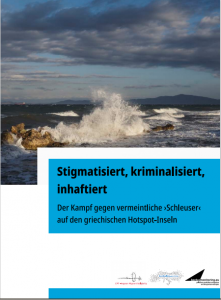 Einigen von ihnen war nicht bewusst, dass sie eine schwere Straftat begangen, als sie ein Boot mit Asylsuchenden von Griechenland in die Türkei steuerten; andere überquerten die Grenze nur, um selbst Asyl in der Europäischen Union zu beantragen. Bei ihrer Ankunft wurden sie verhaftet, oft geschlagen und monatelang in Untersuchungshaft festgehalten und schließlich in einem Gerichtsverfahren verurteilt, das gegen grundlegende Gerechtigkeitsstandards verstößt. Die drastische Kriminalisierung, die in diesem Bericht beschrieben wird, kann nicht ohne den breiteren Rahmen der EU-Politik zur Bekämpfung von ›Schleuserei‹ verstanden werden, die im Folgenden analysiert werden soll. Narrative über ›Menschenschmuggel‹ und die Entwicklung der Gesetzgebung gegen Schleuserei in der Europäischen Union stehen dabei im Mittelpunkt.”
Einigen von ihnen war nicht bewusst, dass sie eine schwere Straftat begangen, als sie ein Boot mit Asylsuchenden von Griechenland in die Türkei steuerten; andere überquerten die Grenze nur, um selbst Asyl in der Europäischen Union zu beantragen. Bei ihrer Ankunft wurden sie verhaftet, oft geschlagen und monatelang in Untersuchungshaft festgehalten und schließlich in einem Gerichtsverfahren verurteilt, das gegen grundlegende Gerechtigkeitsstandards verstößt. Die drastische Kriminalisierung, die in diesem Bericht beschrieben wird, kann nicht ohne den breiteren Rahmen der EU-Politik zur Bekämpfung von ›Schleuserei‹ verstanden werden, die im Folgenden analysiert werden soll. Narrative über ›Menschenschmuggel‹ und die Entwicklung der Gesetzgebung gegen Schleuserei in der Europäischen Union stehen dabei im Mittelpunkt.”
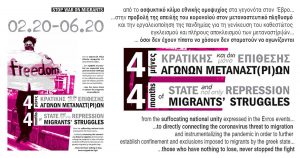
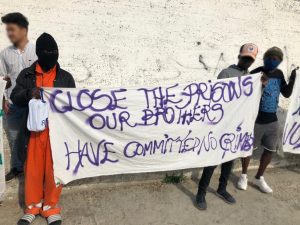
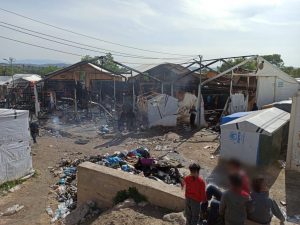
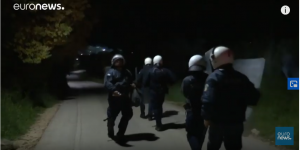
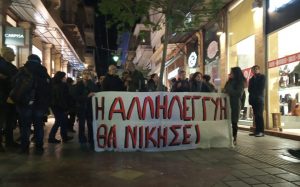 Eine gewaltvolle Bekämpfung von Protesten Geflüchteter in den griechischen Lagern, sowie deren anschließende oft willkürliche Inhaftierung und Kriminalisierung ist fester, struktureller Bestandteil der menschenverachtenden Migrationspolitik der EU. Dieses allgemeine Vorgehen ist während der gegenwärtigen Pandemie wieder verstärkt zu beobachten.
Eine gewaltvolle Bekämpfung von Protesten Geflüchteter in den griechischen Lagern, sowie deren anschließende oft willkürliche Inhaftierung und Kriminalisierung ist fester, struktureller Bestandteil der menschenverachtenden Migrationspolitik der EU. Dieses allgemeine Vorgehen ist während der gegenwärtigen Pandemie wieder verstärkt zu beobachten.